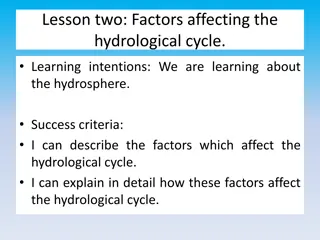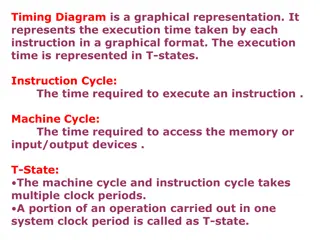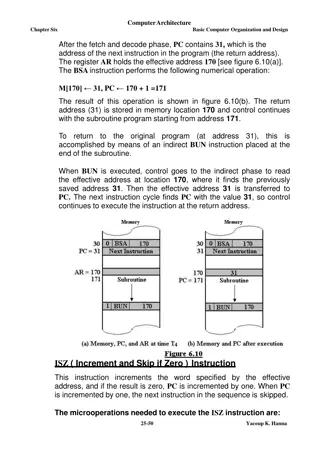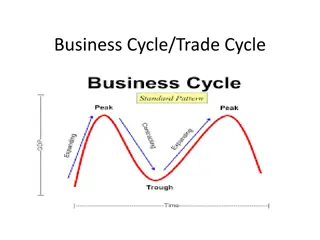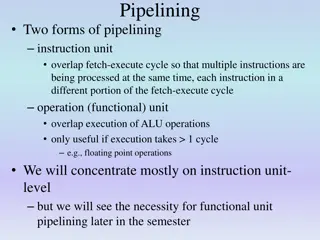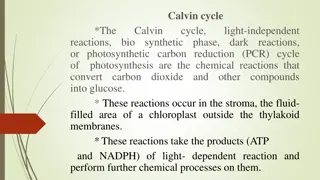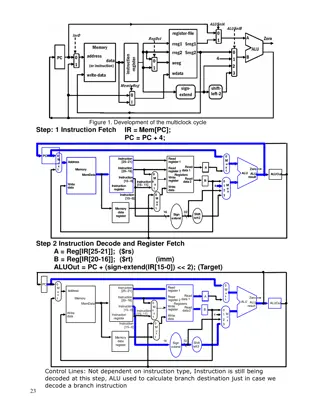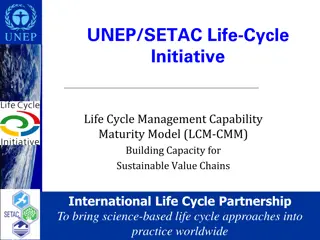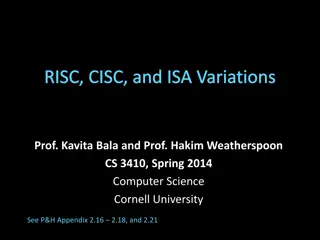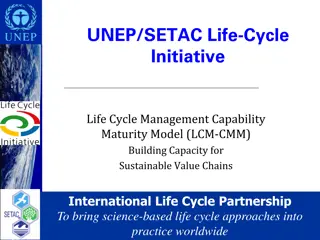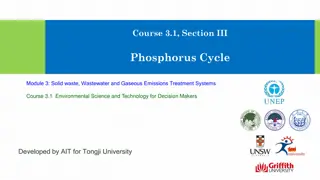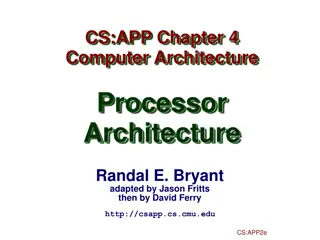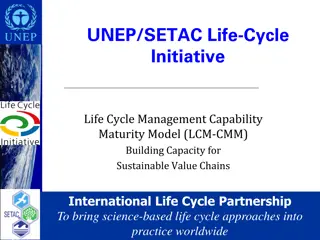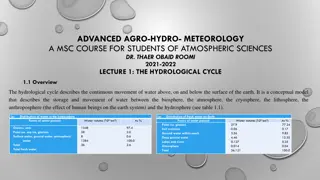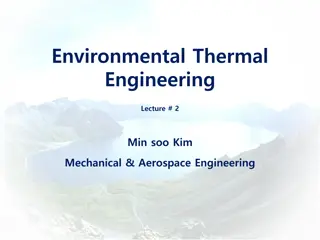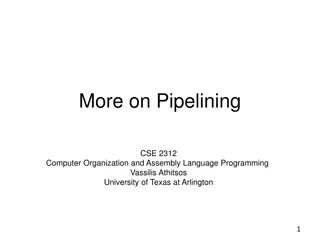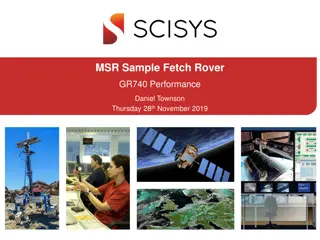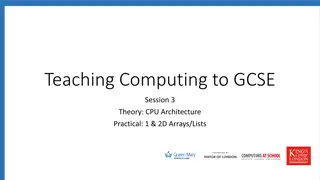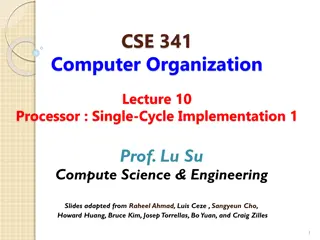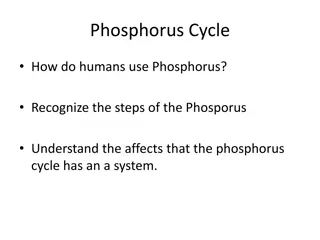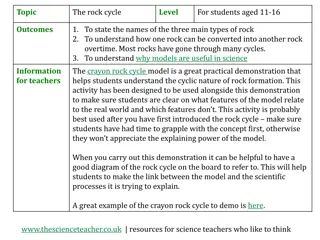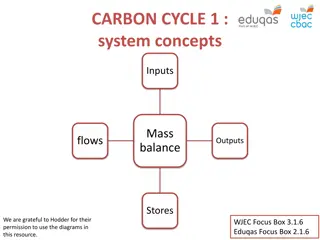Factors Affecting the Hydrological Cycle: Understanding Physical and Human Influences
The hydrological cycle is influenced by both physical and human factors. Physical factors such as relief, vegetation, basin size, rock type, soil type, and climate all play a role in shaping the movement of water through the cycle. Human activities like forestry, urbanization, deforestation, mining,
2 views • 20 slides
Understanding the Accounting Cycle Process
The accounting cycle is a comprehensive process that involves recording and processing all financial transactions of a company, from their occurrence to their representation in financial statements and closing of accounts. It is crucial for bookkeepers to manage the entire cycle, which includes step
0 views • 11 slides
Understanding Timing Diagrams and Machine Cycles in Microprocessors
Timing diagrams provide a visual representation of execution times for instructions in a microprocessor, measured in T-states. This content delves into the concept of machine cycles, such as Opcode fetch cycle and Memory read cycle, in 8085 microprocessors. Exploring the T-states within each cycle,
0 views • 27 slides
Urea Biosynthesis and the Krebs-Henseleit Cycle in the Liver
Urea is synthesized in the liver through a series of enzymatic steps known as the urea cycle or Krebs-Henseleit cycle. This process involves converting toxic ammonia into urea, a less toxic and water-soluble compound that can be easily excreted in urine. The liver plays a crucial role in urea biosyn
1 views • 20 slides
Understanding the Cycle of Erosion: Applied Geomorphology Perspective
The Cycle of Erosion model, developed by Davis in the 1880s, explores the process of landmass upliftment, river erosion, and landscape transformation. The Normal Cycle of Erosion focuses on fluvial processes as the primary geomorphic agent, leading to the formation of peneplains. This cycle progress
0 views • 23 slides
Understanding the Accounting Cycle
The accounting cycle is a comprehensive process that involves recording and processing all financial transactions of a company, from their occurrence to their representation on financial statements and closing the accounts. This cycle, essential for bookkeepers, includes steps like transactions, jou
0 views • 11 slides
Understanding WHERE Clause in DBMS
The WHERE clause in a database management system (DBMS) is used to fetch filtered data based on specific criteria or patterns. Operators such as >, >=, <, <=, =, <>, BETWEEN, LIKE, and IN can be used with the WHERE clause to define filtering conditions. This article explains the usage of WHERE claus
1 views • 24 slides
Computer Architecture and Design: Basic Organization and Operation
The chapter delves into the execution of instructions in a basic computer system, focusing on the fetch, decode, and execute phases. It explains how the program counter (PC) guides the flow of instructions and how operations like BSA, ISZ, and IO are performed. The microoperations involved in execut
0 views • 12 slides
Understanding the Business Cycle and Its Phases
The business cycle, also known as the trade cycle, depicts the cyclical nature of economic activity with alternating periods of prosperity, recession, depression, and recovery. It involves fluctuations in production, prices, income, employment, exports, and imports. The cycle affects all industries
1 views • 15 slides
Understanding Pipelining in Computer Architecture
Pipelining in computer architecture involves overlapping fetch-execute cycles to process multiple instructions concurrently. It utilizes stages, latches, and throughput to enhance CPU performance. Different forms of pipelining, stage-related terms, and the transition from non-pipelined to pipelined
0 views • 64 slides
Understanding the Calvin Cycle in Photosynthesis
The Calvin cycle, also known as the light-independent reactions, is a crucial part of photosynthesis where carbon dioxide is converted into glucose. This cycle occurs in the stroma of chloroplasts and utilizes ATP and NADPH from the light-dependent reactions to produce sugars for plants. It consists
5 views • 15 slides
Ideal Reheat Rankine Cycle Analysis for Steam Power Plant
Analyzing the thermal efficiency and mass flow rate of an ideal Rankine cycle with superheat and reheat using steam as the working fluid. The cycle involves stages of expansion, reheating, and condensing to generate a net power output of 100 MW. Detailed calculations for states of the cycle are prov
1 views • 5 slides
Adapting Contest Strategies for Declining Solar Cycle 24 and Solar Cycle 25 Precursors
As Solar Cycle 24 rapidly declines, preparations for the subsequent Solar Cycle 25 are crucial. Insights on weak solar activity, potentially weak Cycle 25, and the impact on contest strategies are discussed. Improved DX propagation, reliable openings, and signal strengths to Europe and Japan, amidst
0 views • 12 slides
Development of Multiclock Cycle in Processor
The development process of the multiclock cycle in a processor is explained in detail through different steps, including instruction fetch, decode, register fetch, execution, and write-back for R-type instructions. Control lines and branching execution are also covered in the description. The conten
0 views • 5 slides
Memory Management Strategies in Operating Systems
Memory management in operating systems involves organizing and managing main memory efficiently. It includes strategies like fetch, placement, and replacement to optimize the usage of main storage resources. Allocation methods such as bare machine and single-user contiguous storage play a crucial ro
2 views • 26 slides
Recognizing Patterns of Dating Violence and the Cycle of Abuse
Understanding the phases of dating violence is crucial in recognizing and addressing abusive behavior. The cycle typically begins with tension building, leading to an explosion of abuse in various forms. This is followed by a honeymoon phase where the abuser apologizes and makes promises. However, t
0 views • 6 slides
Sustainable Value Chains and Life Cycle Management Capability
The UNEP/SETAC Life-Cycle Initiative focuses on building capacity for sustainable value chains through the Life Cycle Management Capability Maturity Model (LCM-CMM). It emphasizes implementing science-based life cycle approaches globally by transitioning from events to management systems, conducting
1 views • 12 slides
Variations in Computer Architectures: RISC, CISC, and ISA Explained
Delve into the realm of computer architectures with a detailed exploration of Reduced Instruction Set Computing (RISC), Complex Instruction Set Computing (CISC), and Instruction Set Architecture (ISA) variations explained by Prof. Kavita Bala and Prof. Hakim Weatherspoon at Cornell University. Explo
0 views • 55 slides
Life Cycle Management for Sustainable Value Chains: Building Capacity and Promoting Innovation
This content delves into the Life Cycle Management Capability Maturity Model (LCM-CMM) aimed at enhancing sustainable value chains globally. It emphasizes the importance of bringing science-based life cycle approaches into practical implementation to address global issues, international standards, c
1 views • 11 slides
Fuel Cycle Analysis Toolbox: Enhancing Understanding and Optimization
This presentation focuses on the analyses and evaluations essential for assessing the potential of a fuel cycle, emphasizing different time scales, system sizes, objectives, and audiences. It discusses the need for coupled analyses, various tools required, and opportunities for improvement through i
1 views • 11 slides
Understanding the Phosphorus Cycle in Environmental Science
Exploring the intricate processes of the phosphorus cycle, this module delves into how solid waste, wastewater, and gaseous emissions are treated within environmental science and technology frameworks. The discussion covers the distinctive aspects of the phosphorus cycle, its impact on land and wate
0 views • 13 slides
Introduction to Y86 Instruction Set Architecture
Y86 Instruction Set Architecture is a simplified pseudo-language based on x86 (IA-32) architecture. It involves implementing the Fetch-Decode-Execute cycle, where instructions are fetched from memory, decoded, and executed. The Y86 ISA offers a simpler set of instructions and formats compared to x86
0 views • 25 slides
Role of Cell Cycle in Nanoparticle Uptake and Dilution in Cell Population
The cell cycle plays a crucial role in the cellular uptake and dilution of nanoparticles within a cell population. This process involves different phases such as G1, S, G2, and M, each with specific functions related to cell growth, DNA synthesis, protein synthesis, and cell division. Understanding
0 views • 20 slides
Sustainable Value Chains and Business Context in Life Cycle Management
The UNEP/SETAC Life-Cycle Initiative focuses on building capacity for sustainable value chains worldwide through the Life Cycle Management Capability Maturity Model. Understanding the competitive, environmental, and business contexts is crucial for implementing science-based life cycle approaches ef
0 views • 15 slides
Understanding the Hydrological Cycle in Advanced Agro-Hydro-Meteorology
The hydrological cycle involves the continuous movement of water on, above, and below the Earth's surface, encompassing various realms such as the biosphere, atmosphere, cryosphere, lithosphere, and hydrosphere. This cycle describes the storage and movement of water within different Earth systems an
0 views • 14 slides
Understanding Processor Cycles and Machine Cycles in 8085 Microprocessor
Processor cycles in microprocessors like 8085 involve executing instructions through machine cycles that are essential operations performed by the processor. In the 8085 microprocessor, there are seven basic machine cycles, each serving a specific purpose such as fetching opcodes, reading from memor
0 views • 17 slides
Fundamentals of Environmental Thermal Engineering in Mechanical & Aerospace Engineering
Explore the key concepts of environmental thermal engineering in Mechanical & Aerospace Engineering, covering topics such as the Carnot cycle, actual vapor-compression cycle, principles of the vapor-compression cycle, Carnot heat engine, refrigeration cycle, and coefficient of performance. Understan
0 views • 51 slides
Understanding Cell Cycle Control in Biology
Maintaining control of the cell cycle is crucial to producing healthy daughter cells and preventing mutations that can lead to degenerative diseases like Parkinson's or cancer. Cell cycle checkpoints at G1, G2, and Metaphase ensure the cell meets specific requirements before progressing to the next
0 views • 11 slides
Understanding the Fetch-Decode-Execute Cycle in Computer Processing
Exploring the fundamental process of executing a program in a computer through the fetch-decode-execute cycle. This cycle involves loading programs and data into the computer's memory, fetching and executing instructions sequentially, and managing memory operations effectively. The interaction betwe
0 views • 13 slides
Understanding Pipelining in Computer Organization
Explore the intricate process of pipelining in computer organization and assembly language programming. Delve into the fetch-decode-execute cycle, toy ISA instructions, defining pipeline behavior, and the pipeline steps for different instructions. Gain insights into how instructions progress through
0 views • 37 slides
Comparison Study Between ExoMars and Sample Fetch Rover Visual Localization Algorithms
Two space projects, ExoMars and Sample Fetch Rover, are compared based on their Visual Localization algorithms. The study focuses on the timing performance, ease of use, and consistency with previous results of the GR740 processor. Visual Odometry and challenges like motion blur and lighting differe
0 views • 16 slides
Exploring Modern Web Development Techniques
Explore the evolution of website development from traditional to modern approaches like AJAX, single-page applications, and managing history entries. Learn about Asynchronous JavaScript and XML, using the Fetch API, and transitioning from XMLHttpRequest to fetch in web browsers. Discover how to mani
0 views • 10 slides
Understanding CPU Architecture in Computing for GCSE Students
Explore the fundamental concepts of CPU architecture, including the Von Neumann Architecture, common CPU components like ALU and CU, and how characteristics such as Clock Speed and Cache Size impact performance. Learn about the Fetch-Execute Cycle and the essential hardware components of a computer
0 views • 18 slides
Understanding the Estrous Cycle in Female Animals
The estrous cycle is a reproductive phenomenon in female animals, consisting of different phases like proestrus, estrus, metestrus, and diestrus. This cycle determines the periods of sexual receptivity and fertility in various species such as cows, ewes, sows, and mares. Factors like season, nutriti
0 views • 20 slides
Overview of Single-Cycle Implementation in Computer Organization
Today's lecture discussed the single-cycle implementation of processors, focusing on executing instructions in hardware based on the ISA. The process involves different cycles such as instruction fetch, decode, execution, memory access, and write-back. The presentation highlighted the functions of a
0 views • 24 slides
Parallel Processing in Computer Organization
Computers can be classified based on data and instruction streams, forming various types of structures. Parallel processing levels can be defined based on instruction and data stream categorization, proposed by Michael Flynn in 1972. The instruction cycle consists of steps needed for executing instr
0 views • 44 slides
Understanding the Phosphorus Cycle and Its Impact on Ecosystems
Humans use phosphorus in various ways, from being a vital component in DNA, RNA, and cell membranes to its role in energy transfer processes. The phosphorus cycle involves steps such as weathering of rocks, phosphate mining for fertilizers, excretion/decomposition, and geologic forces. However, exce
0 views • 8 slides
Exploring the Rock Cycle Using the Crayon Rock Cycle Model
This educational resource focuses on teaching students aged 11-16 about the rock cycle, including the types of rocks, how rocks transform over time, and the importance of models in science. It introduces the crayon rock cycle model as a hands-on demonstration to help students grasp the cyclic nature
0 views • 4 slides
Illustrated Design of a Simplified CPU with 16-bit RAM
Demonstrates the design of a basic CPU with 11 instructions and 4096 16-bit RAM, showcasing the assembly of a general-purpose computer using gates and registers. The CPU comprises 8 key registers for various functions, employing a sequential circuit for instruction execution. The machine language pr
0 views • 31 slides
Understanding the Carbon Cycle: System Concepts and Pathways
The carbon cycle involves the movement of carbon between different stores in the global system, such as the atmosphere, oceans, and biosphere. Flows, inputs, and outputs play crucial roles in this cycle, with processes like photosynthesis and respiration impacting carbon levels. Explore how mass bal
0 views • 13 slides
